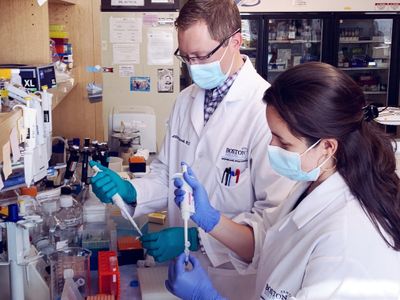Resident Academic Development Time
 The Boston University Chobanian & Avedisian School of Medicine/Boston Medical Center (BMC) General Surgery Residency Program provides residents with a wide range of opportunities to pursue various research interests. Residents participate in research while in clinical training and are able to undertake dedicated research time after their second or third year. Research can be in any number of fields, including basic science/translational research, clinical outcomes, quality improvement, surgical education, innovation/device development, and global health.
The Boston University Chobanian & Avedisian School of Medicine/Boston Medical Center (BMC) General Surgery Residency Program provides residents with a wide range of opportunities to pursue various research interests. Residents participate in research while in clinical training and are able to undertake dedicated research time after their second or third year. Research can be in any number of fields, including basic science/translational research, clinical outcomes, quality improvement, surgical education, innovation/device development, and global health.
On average, three residents per class pursue dedicated research time, most often for two years. During this academic development time, the trainee engages in an approved series of activities intended to enhance their future academic career. Our residents have the option of participating in post-doctoral research fellowships within the Boston University Medical Campus and Boston Medical Center, as well as outside our institution. Many of our residents have been awarded T-32 training grants, among other funding resources. There are ample opportunities for research residents to take advantage of course work in epidemiology, statistics, and public health, with some residents pursuing degree programs at the Boston University School of Public Health right here on campus.
We are very proud of the work that our research residents are currently engaged in, as well as work done in the past several years on a wide range of topics. We invite you to read more.
The Department of Surgery also offers post-doctoral research fellowships to residents from other programs, both through our Surgical Outcomes Analysis Research (SOAR) Initiative and the Boston Trauma Institute (BTI). Researchers in the SOAR lab work on a wide range of outcomes research using national, regional, and local databases as well as institutional data, with a focus on inequalities in access to services, care received, and outcomes of surgical patients. The Boston Trauma Institute examines how social determinants of health—education, neighborhood, employment, social support networks, and access to health care—impact victims of violence and translates this information to develop and implement institutional initiatives.